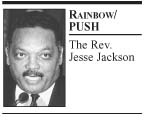 "Divorced Mother of Two, Working Way ThroughCollege, Allegedly Raped, Abused by Gang." Had the headline read that way, the fury would have been great. The facts that the police didn't arrest anyone, that the gang was not talking, that it took two days for the police to search the scene of the crime would have added to the anger.
"Divorced Mother of Two, Working Way ThroughCollege, Allegedly Raped, Abused by Gang." Had the headline read that way, the fury would have been great. The facts that the police didn't arrest anyone, that the gang was not talking, that it took two days for the police to search the scene of the crime would have added to the anger.
But that's not how it was reported. Rather, it was reported that a Black stripper was accusing members of the Duke lacrosse team of rape after she and another woman were hired to dance for them at a party. That method of reportage put race and class in the center of the story. Predictably, the right-wing media machine has kicked in, prompting mean-spirited attacks upon the accuser's character.
Rush Limbaugh called the two women strippers "hoes," and later apologized saying "I regret you heard me say that." And fellow talk radio host Michael Savage referred to the alleged victim as a "Durham dirt-bag" and "dirty, verminous Black stripper."
And it is in this tense atmosphere that the accuser flees from home to home, fearing for her safety. We don't know exactly what happened that night. Initial DNA tests came back negative, incriminating no one. Durham District Attorney Michael Nifong asserts that the lack of DNA evidence "doesn't mean nothing happened. It just means nothing was left behind." The DA is putting the case before a grand jury.
The players say that they used aliases to hire strippers for a team party at the house rented by the team captains. The accuser goes to school full-time at North Carolina Central, and for the past two months has worked at an escort service to help pay her way through school and support her two children. She and her partner found themselves in a party of more than 30 White male lacrosse players.
We know that the two women were abused. The accuser says they were met with racial slurs, and stopped dancing and decided to leave. "We started to cry," she said, "we were so scared." They left, but team members came out, apologized and convinced them to come back. A neighbor reports seeing them leave and then come back and confirms hearing racial slurs.
The accuser says once they returned, they were separated and she was pushed into a bathroom by three men, strangled, raped, kicked and beaten. The players deny that that happened. Admitted to a hospital, her tests showed injuries consistent with rape and physical assault.
Black women, White men. A stripper and a team blowout. The wealthy White athletes of Duke, and the working-class woman from historically Black North Carolina Central. Race and class and sex. What happened? We don't know for sure because the Duke players are maintaining a code of silence. The players got lawyers immediately, who advised them to talk to no one.
The history of White men and Black women — the special fantasies and realities of exploitation — goes back to the nation's beginning and the arrival of slaves from Africa. The patterns associated with this history arouse fears and evoke too many bad memories.
Duke's president cancelled the team's season and accepted the resignation of its coach. He convened five panels to look into various aspects of the incident. At Duke, North Carolina Central and schools across the country, students and administrators began discussing once more the combustible realities of racial and sexual harassment on campus.
Durham, N.C., where Duke is located, is not the old South. Its mayor is Black, as is its police chief and the majority of its city council. It is relatively prosperous, with low unemployment. The largest Black-owned insurance company is located there as are two Black-owned banks. There is also poverty, disproportionately African American. And there is Duke, a private school stocked with affluent, mostly White kids.
In the wake of the Duke scandal, Black women across the country report on how often they are harassed or treated as objects available to hit on by White men. This image is magnified in our culture — not simply by White producers, but on Black music videos and networks as well.
The Duke scandal should lead colleges across the country to hold searching discussions about racial and sexual stereotypes.
But it shouldn't take the brutalizing of a mother of two to raise these issues.
The Rev. Jesse Jackson Sr. is founder and president of the Rainbow/PUSH Coalition.






















































































































































































































































































































